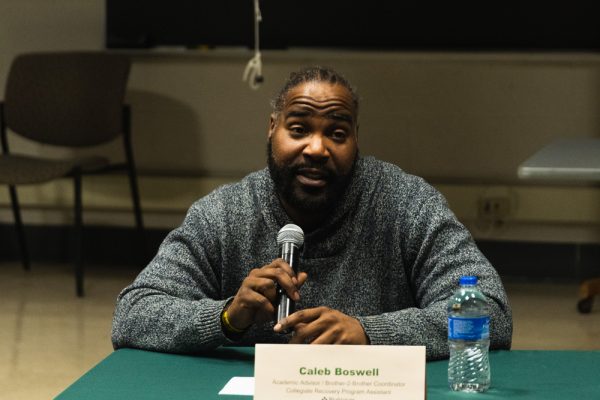
Caleb Boswell, a student adviser, speaks as one of the panelists at the Strength Over Silence event. Sanadhi Tedrow | Washtenaw Voice
By Samadhi Tedrow
Contributor
WCC has taken an initiative to expose the silent truths surrounding mental and psychological health issues among the minority demographic at WCC.
On March 3, the Counseling and Career Planning department took a step towards giving the minority population a voice by hosting an event called “Strength Over Silence.”
Four staff members from the counseling and student resources departments—Cheryl Finley, Caleb Browell, Kim Groce and Anthony Webster—answered questions and played a small docuseries called “Strength Over Silence,” which features minorities across the nation who silently faced their mental illnesses and eventually surpassed them.
Two of the individuals in the docuseries were A.J. Mendez, a former wrestler of Puerto Rican descent, and Lorenzo Lewis, founder and CEO of The Confess Project, a mental health advocacy initiative for young men of color. Mendez and Lewis discussed the ramifications of remaining silent in the face of mental illness, and advocated for breaking the stigmatization that mental illness is a “white man’s sickness.”
Lewis was born into a prison, and lost both of his parents at a young age. Being so entwined with the prison system affected Lewis. He developed depression and repressed his anger for years.
“I can remember going through different struggles with a woman, or even with my own self,” said Lewis during one of his Confess Project meetings videos. “[I] was feeling like I was caged by society, not being able to meet the expectations of a man.”
Lewis said that by going to therapy he began to “win in life.” He said having “one-on-one” time with a therapist or a loved one will “take you far.”
A.J. Mendez, who has spoken on her bipolar disorder and strict upbringing in Puerto Rico, brought up in the docuseries the condition of “toughness,” which is not only embedded in some minority cultures, but across the nation as well.
“We are a community that is expected to work twice as hard to be seen as equal,” said Mendez. “I would tell any Hispanic family that it takes so much more strength to ask for help.”
“We don’t have to be ‘tougher,’” she said. “Strength does not have to be synonymous with silence.”
Within the confines of industrialized and inborn racism in the nation, these unjust stigmas have indirectly forced many minority communities to act robotic, as opposed to expressing healthy vulnerability.
It’s important to reach out and support minority students whenever possible, said Webster, a student retention specialist and counselor at WCC, during the event. He said we must remain vigilant and knowledgeable about the pressures of college and home life and how they correlate to one’s mental health.
Groce “representation matters” when it comes to mental health advocacy. She explained that it’s important to promote connections among minority students in order to help mitigate stress and fear.
Suicide is the third leading cause of death for 15 to 24-year-old African American individuals, according to the “Brother You’re on My Mind” program from National Institute on Minority Health and Health Disparities.
African American individuals are also 20% more likely than their white counterparts to experience “severe psychological distress,” and “the proportion of African Americans who need mental health treatment and get it is only half that of whites,” according to a statistics factsheet from Brother You’re on My Mind.
Bridging the gap between the minority student body and staff is an important step in the right direction, according to panelists. The counseling department at WCC is taking a conscious initiative to link minority students—and all students across campus—to mental health resources.
